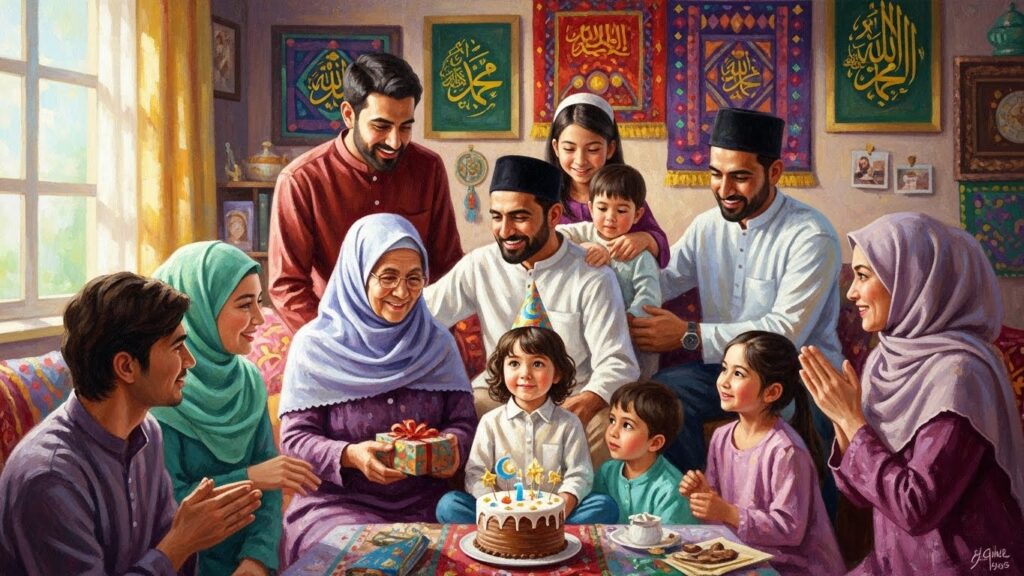Discover the Islamic view on birthdays. Learn what Islam says about birthday celebrations, their permissibility, and the teachings of the Quran and Hadith.
Introduction
Birthdays are celebrated all over the world with cakes, candles and gatherings. Many Muslims also grow up seeing birthday celebrations around them which naturally raises an important question:
what does Islam say about birthdays? Is celebrating a birthday allowed, or should Muslims approach it differently?
To understand this issue clearly, we need to look at Islamic teachings with an open and balanced mind.“مَنْ أَحْدَثَ فِي أَمْرِنَا هَذَا مَا لَيْسَ مِنْهُ فَهُوَ رَدٌّ”
(Whoever introduces into this affair of ours something that is not from it, it is rejected.)
[Sahih al-Bukhari & Sahih Muslim]
Muslims want to know if celebrating birthdays is considered a good practice or if it falls under acts that Islam does not permit. The discussion usually revolves around whether birthday celebrations are simply cultural or if they count as a religious innovation.
In this article we explore the Islamic perspective on birthdays in a clear and simple way. We look at what the Quran teaches, what the Hadith mention, and how Islamic scholars explain this topic.

What Does Islam Say About Birthdays?
Islam gives guidance on every part of life. Muslims often ask if birthdays are allowed in Islam. The Quran does not mention birthdays directly. The Prophet Muhammad ﷺ also did not celebrate his own birthday in the way people do today. Because of this scholars look at Islamic principles to form an opinion.
Some scholars say celebrating birthdays is not part of Islam. They argue that the religion already gives Muslims two festivals: Eid al-Fitr and Eid al-Adha. They believe adding another celebration is an innovation known as Bid’ah. Islam warns against adding new acts of worship that the Prophet ﷺ did not teach.
Other scholars take a different view. They say a birthday is a cultural event not a religious one. They argue that if a Muslim marks their birthday by thanking Allah spending time with family or giving charity it does not go against Islamic teachings.
Muslims therefore find different opinions on this matter. The key point is to avoid activities that Islam clearly forbids, such as extravagance, music or imitating non-Muslim religious practices.
Celebrating Birthdays in Islam – Permissible or Not?
Muslims often debate whether celebrating a birthday in Islam is right or wrong. Scholars hold different views on this matter. Some strongly oppose birthday celebrations while others allow them under certain conditions.
Why Many Scholars Say Birthday Celebrations in Islam Are Not Allowed
Many scholars argue that celebrating a birthday in Islam is not part of the religion. They explain that Islam already has two main celebrations, Eid al-Fitr and Eid al-Adha. Adding another celebration is seen as Bid’ah, or innovation.
The Prophet Muhammad ﷺ warned Muslims against creating new acts of worship. Scholars who hold this view believe birthdays fall into this category. They also warn that imitating non-Muslim traditions can weaken Islamic identity.
Why Some Scholars See Birthday in Islam as a Cultural Practice
Other scholars take a softer approach. They say a birthday in Islam can be treated as a cultural practice rather than a religious act. For example, if a Muslim spends the day by thanking Allah, making dua, or giving charity, then the celebration does not break Islamic rules.
These scholars emphasize that the intention matters. If the gathering stays free from haram activities it can be acceptable.
How Muslims Can Approach Birthday Celebrations in Islam
Muslims must choose wisely when it comes to birthdays. They should avoid music wasteful spending or copying non-Muslim religious customs.
Instead, they can mark the day with gratitude, reflection, and family bonding. By doing this, they stay within Islamic teachings while still acknowledging their special day.
How Muslims Can Mark Their Birthday in a Halal Way
Muslims can make their birthday in Islam meaningful without breaking Islamic rules. A halal celebration avoids waste, sin and imitation of non-Muslim customs. Instead, it focuses on gratitude, good deeds, and family bonds.
Make Dua and Thank Allah on a Birthday in Islam
Muslims should begin their birthday by turning to Allah. Making sincere dua and thanking Him for another year of life brings peace. A simple prayer for guidance, health, and long life in obedience to Allah makes the day spiritual and rewarding.
Give Charity on a Birthday in Islam
Charity is a powerful way to celebrate a birthday in Islam. Feeding the poor, supporting an orphan, or helping someone in need adds value to the day. These acts bring blessings and reflect the true spirit of gratitude.
Spend Time With Family on a Birthday in Islam
Islam encourages strong family ties. Spending time with parents, children, and relatives makes the birthday meaningful. Sharing a meal or sitting together strengthens love and unity.
This form of celebration avoids extravagance and builds stronger relationships.
Reflect on Life and Purpose on a Birthday in Islam
A birthday in Islam should remind Muslims that time is passing. Reflection on life helps them realize how short this world is and how near the Hereafter may be.
By renewing their intention to live in obedience to Allah Muslims give their birthday a deeper purpose.
Birthday in Islam Is Not Always Haram
Many Muslims think that every birthday in Islam is haram. This belief comes from the idea that birthdays are an innovation. Some scholars do forbid birthday celebrations for this reason. They argue that Islam only recognizes two official festivals: Eid al-Fitr and Eid al-Adha.
Other scholars take a different view. They say a birthday in Islam can be halal if it remains cultural and free from haram acts.
A simple gathering offering thanks to Allah or giving charity does not go against Islamic principles. Intention matters the most. If the purpose is to show gratitude and strengthen family bonds then the celebration does not count as sinful.
This difference of opinion shows that a birthday in Islam is not always haram. The ruling depends on how Muslims choose to mark the day.
Birthday in Islam Does Not Replace Islamic Festivals
Some Muslims think that birthdays in Islam compete with or replace the two official festivals. This belief is not correct. Islam clearly gives Muslims two major celebrations: Eid al-Fitr and Eid al-Adha. These days are acts of worship, and they hold great spiritual value.
A birthday in Islam does not carry the same status. It is not a festival in the religious sense. When Muslims mark a birthday they do it as a cultural practice, not as an act of worship. Scholars explain that as long as Muslims keep this distinction clear the birthday does not interfere with the importance of Eid.
Celebrating a birthday in Islam should never reduce the honor of Eid. Muslims must continue to observe Eid with prayers, charity and family gatherings.
A simple birthday gathering remains separate and does not replace the joy or spiritual meaning of Islamic festivals.

Quranic Verses
The Quran teaches Muslims to follow the straight path and avoid imitating practices that lead them away from Allah. Allah says:
وَأَنَّ هَٰذَا صِرَاطِي مُسْتَقِيمًا فَاتَّبِعُوهُ وَلَا تَتَّبِعُوا السُّبُلَ فَتَفَرَّقَ بِكُمْ عَنْ سَبِيلِهِ
(And, indeed, this is My straight path, so follow it; and do not follow other ways, for they will separate you from His way.) [Surah Al-An’am 6:153]
This verse reminds Muslims to stay firm on the path of Islam and avoid practices that may lead them astray, including unnecessary innovations.
Many people see birthdays only as a chance for fun and gifts. However, in Islam, a birthday can serve a much deeper purpose. Instead of focusing only on celebration, Muslims can use this day to reflect on their life and draw closer to Allah.
The Quran often reminds believers about the value of time and the shortness of life. Allah says:
كُلُّ نَفْسٍ ذَائِقَةُ الْمَوْتِ
(Every soul shall taste death.) [Surah Al-Imran 3:185]
This verse shifts the focus from worldly joy to eternal accountability. Therefore, when a Muslim remembers their birthday they should also remember that each passing year brings them closer to the Hereafter.
Hadith About Birthdays in Islam
The Prophet Muhammad ﷺ never celebrated his own birthday in the way people do today. Therefore, no Hadith directly mentions birthdays in Islam.
However, several authentic Hadith guide Muslims on how to approach new practices. These teachings help scholars form their opinions about birthday celebrations.
Hadith on Innovation and Birthdays in Islam
The Prophet ﷺ warned against introducing new practices into religion. He said:
“مَنْ أَحْدَثَ فِي أَمْرِنَا هَذَا مَا لَيْسَ مِنْهُ فَهُوَ رَدٌّ”
(Whoever introduces into this affair of ours something that is not from it, it is rejected.)
[Sahih al-Bukhari & Sahih Muslim]
This Hadith makes it clear that Islam does not accept new acts of worship. Therefore, scholars who forbid birthdays in Islam see them as a form of Bid’ah (innovation).
Hadith on Imitation and Birthdays in Islam
The Prophet ﷺ also warned Muslims not to blindly copy others. He said:
“مَنْ تَشَبَّهَ بِقَوْمٍ فَهُوَ مِنْهُمْ”
(Whoever imitates a people is one of them.)
[Sunan Abu Dawood]
Because of this Hadith, some scholars argue that celebrating birthdays in Islam resembles non-Muslim customs. They believe Muslims should avoid such imitation.
Hadith on Gratitude and Birthdays in Islam
On the other hand, the Prophet ﷺ encouraged gratitude. He said:
“مَنْ لَا يَشْكُرِ النَّاسَ لَا يَشْكُرِ اللَّهَ”
(Whoever does not thank people has not thanked Allah.)
[Sunan Abu Dawood]
This Hadith highlights the importance of showing thankfulness. Therefore, some scholars say Muslims can use their birthday in Islam as a chance to thank Allah, perform good deeds and strengthen family ties.
Conclusion
The discussion about birthdays in Islam brings different opinions among scholars. Some strongly oppose the practice, calling it an innovation. They argue that Islam already gives Muslims two clear celebrations: Eid al-Fitr and Eid al-Adha. Therefore, adding birthdays as another festival goes against the teachings of the Prophet Muhammad ﷺ.
However, other scholars allow birthdays in Islam as long as they stay cultural, not religious. They explain that marking the day with gratitude, charity, and family gatherings does not conflict with Islamic principles. What matters most is the intention and the way Muslims choose to celebrate.
The Quran guides believers to follow the straight path, while Hadith warns against harmful innovations. At the same time, Islam encourages gratitude, reflection, and good deeds. For this reason, a Muslim can turn a birthday into an opportunity to thank Allah, reflect on life, and strengthen family bonds.
In the end, a birthday in Islam should not copy non-Muslim traditions or involve haram acts. Instead, it can become a day of faith, gratitude, and self-improvement. By keeping celebrations simple and halal, Muslims can honor Allah’s blessings and give their birthday a meaningful purpose.
“In Islam, a birthday becomes truly meaningful when it turns into a moment of gratitude to Allah and a reminder of life’s purpose.”
